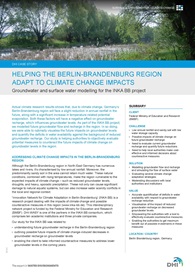Helping the Berlin-Brandenburg region adapt to climate change impacts
As part of the Innovations Netzwerk für KlimaAnpassung in Berlin Brandenburg (INKA BB) project, we modelled future groundwater flow and recharge in Germany’s Berlin Brandenburg region.
 As part of the Innovations Netzwerk für KlimaAnpassung in Berlin Brandenburg (INKA BB) project, we modelled future groundwater flow and recharge in Germany’s Berlin Brandenburg region. In so doing, we were able to optimally visualise the future impacts on groundwater levels and quantify the deficits in water availability with respect to reducing groundwater recharge.
As part of the Innovations Netzwerk für KlimaAnpassung in Berlin Brandenburg (INKA BB) project, we modelled future groundwater flow and recharge in Germany’s Berlin Brandenburg region. In so doing, we were able to optimally visualise the future impacts on groundwater levels and quantify the deficits in water availability with respect to reducing groundwater recharge.
Berlin Brandenburg is characterised by low annual rainfall and predominantly sandy soil that cannot retain much water. These natural conditions, combined with rising temperatures, make the region vulnerable to the expected impacts of climate change – such as reduced groundwater levels.
INKA BB is a research project dealing with the impacts of climate change in this region and possible counteractive measures for the same. DHI-WASY is one of the partners in the INKA BB consortium.
Our study for the INKA BB was related to:
- understanding future groundwater recharge in the Berlin Brandenburg region
- outlining possible future impacts of climate change-induced decreases in groundwater recharge on groundwater levels
- enabling the client to take informed, counteractive measures to address lower groundwater levels in the coming years
To study current and future groundwater recharge levels in the region, we conducted several modelling studies. Our study helped authorities objectively evaluate potential measures to counteract the future impacts of climate change on groundwater levels in the region.
Read more